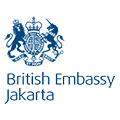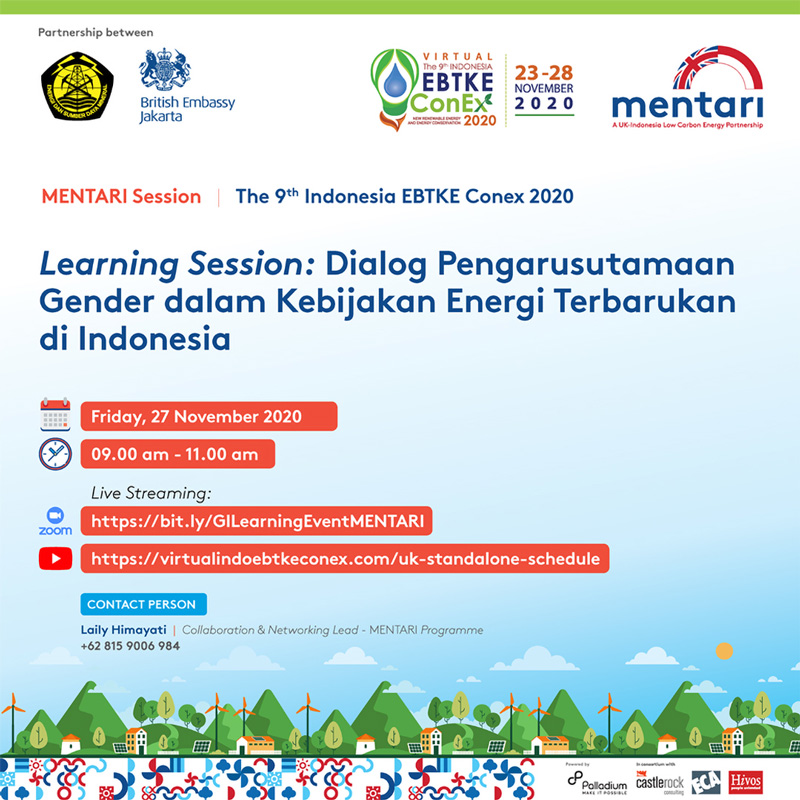The Role of Women and Inclusive Groups Must Be Integrated in All Renewable Energy Sector Development
Jakarta, 27th November 2020 – It is time for the development of the renewable energy sector to include gender and be inclusive in every element. For it is proven, women particularly become the most vulnerable group when they do not have access to energy such as electricity and lighting, for example.
This finding was revealed during the Learning Session: Dialogue on Gender Mainstreaming In Indonesia’s Renewable Energy Policy, Friday (27/11) in Jakarta. The discussion was part of MENTARI’s contribution and participation at The 9th Indonesia EBTKE Virtual Conference and Exhibition 2020, occurred on 23 – 28 November 2020.
It was moderated by Pande K. Trimayuni, Gender and Inclusivism Lead, MENTARI (Towards a Low Carbon Energy Transition in Indonesia) program and by presenting speakers Zainal Arifin Abbas, Head of Economic and Natural Resources Division, East Sumba Development Planning Board (Bappeda); DR Hariyanto, Director of Energy Conservation, Directorate General of Renewable Energy and Energy Conservation (EBTKE) of the Ministry of Energy and Mineral Resources (ESDM); Maya Rostanty, Director of Center for Regional Information and Studies (Pattiro). A welcoming and opening speech was conducted by Julio Retana, Team Leader of MENTARI Program. Beside the speakers, the discussion also presented a responder Krisdianto, Head of Gender Equality Division, Ministry of Women Empowerment and Child Protection (KPPPA).
“For example, the main household consumer of electricity is actually women. In this level, when there is no electricity a lot of women’s time is wasted just making sure the family’s needs are met. For instance, they should ensure the availability of kerosene for home lighting, or cook with firewood, or even fetch for clean water,” described Maya Rostanty.
It has been confirmed, involving women and inclusive groups in various aspects of development, including ensuring the availability of energy for them, improve the quality of women’s lives, families and even communities. This concrete example was revealed by Zainal Arifin Abbas, he told a story about Luku Winggir Village located at Kambata Mampambuhang sub-district, East Sumba, which currently has become a Model Village after the village has integrated gender and inclusiveness in various development policies.
This condition has occurred since renewable energy has been developed in East Sumba, especially by HIVOS, then it also has provided significant economic development to the locals, including women. They even established Marangga Panamo Forum, a medium that can accommodate the integration of all sectors in the village.
“If we do not open ourselves and our mind to various parties who want to contribute their best support for our village, perhaps we could not make it come true. We also have to ensure legal umbrella for gender integration. Currently, the energy utilization has provided positive function for women in increasing their capacities. The access to energy even provides sufficient space for women to do business, and with their business those women can overcome poverty problems and improve their quality of life,” he explained.
As a matter of fact, the integration of gender and inclusiveness in various development sectors have been entrusted also in the Sustainable Development Goals (SDGs), and Indonesia has a clear legal umbrella, through Presidential Instruction (Inpres) No. 9/2000 on Gender Mainstreaming in National Development, in this case, gender must be included in national scale development, including renewable energy. This is described by Krisdianto, Head of Gender Equality Division, Ministry of Women Empowerment and Child Protection (KPPPA). In fact, the priority for gender equality has also been stated in the National Medium-Term Development Plan (RPJMN) until 2024. (Mufarayani/MENTARI)







